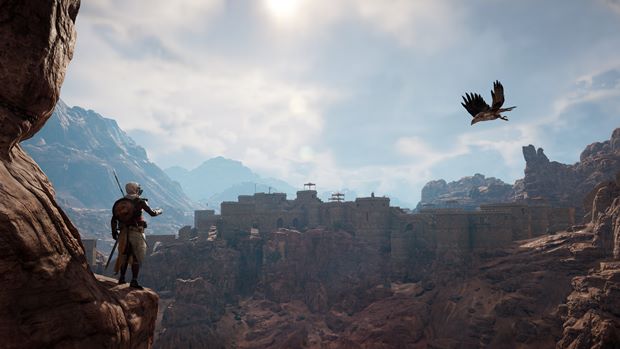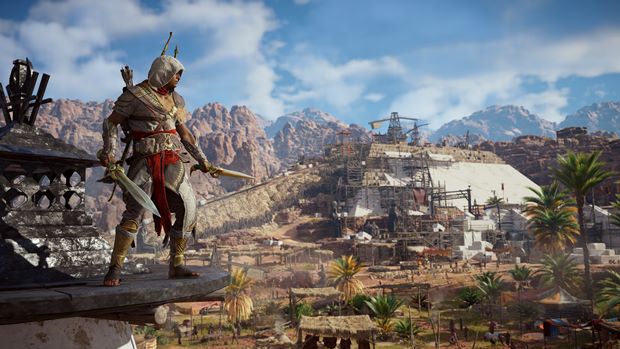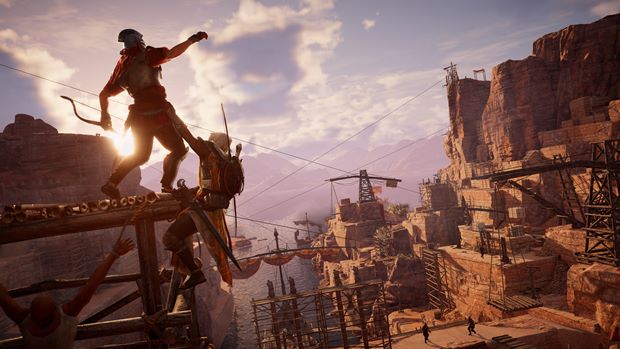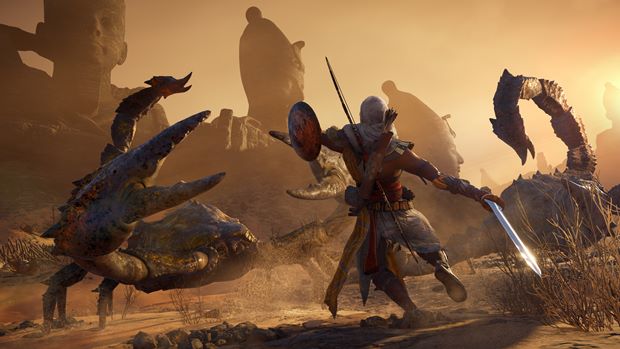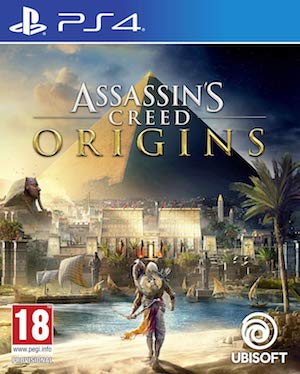
It has happened twice now that Ubisoft’s Assassin’s Creed series has had a disappointing entry (or two), at which point people have begun to lose faith in the IP. Both of those times, Ubisoft has delivered a rethinking of the franchise, and in the process, delivered energetic, great games that stand as the best in the series- first, with Assassin’s Creed, which disappointed many, only to be followed by Assassin’s Creed II, an excellent rethinking of the original game’s ideas, and a game that went on to influence a generation of open world titles that would follow in its wake. Then there were Revelations and Assassin’s Creed III, a double whammy of underwhelming games following the excellent run of II and Brotherhood; again, Ubisoft rethought the franchise, giving it a new garb with the excellent swashbuckling pirate adventure Black Flag, which remains the high watermark of the series.
But Assassin’s Creed has never been in the doldrums quite like this before. The series’ debut on current generation platforms, Unity, was an utter disaster at launch, plagued with bugs and glitches, and shipping in a generally unfinished state. While patches and updates brought the game to an acceptable level better, they couldn’t fix the fundamentally underwhelming and bland design, plagued by feature creep and bloat, that had begun to drag the franchise down by now. And while the follow-up, the low key Syndicate, was better, it couldn’t get out of the shadow of Unity’s shadow, and failed to do too well either critically or commercially.
"The most disappointing aspect of Origins, however, is not the storytelling—it’s the sheer lack of polish the game has, which is especially perplexing given that it had a four year long development cycle."
Things got dire enough that Ubisoft, in an unexpected move, announced that the until then annual Assassin’s Creed franchise would be taking a year off in 2016. In 2017, the series is returning after its hiatus with Assassin’s Creed Origins, a dramatic rethinking of the series’ mythos, lore, traditions, mechanics, conventions, and structure. Four years in the making, Origins reimagines the franchise as an action RPG in the vein of The Witcher 3, presenting an unbelievably massive systemic open world sandbox, stuffed with interlocking mechanics, activities, quests, and missions, and following the odyssey of Bayuk, and the founding of the Assassin brotherhood in ancient Egypt- which feels like a concession to fans who had been demanding that setting in the series for years, now.
The incredible thing here is, in spite of the negative momentum and inertia that the Assassin’s Creed franchise had built up over the last three years, Origins is just about good enough to stem and counter it entirely. It’s a compelling, well made, hugely addictive, delightful open world game that represents the kind of dramatic rethinking of a major franchise that we see rarely in the industry.
Origins completes the Assassin’s Creed franchise’s transition towards action RPG. You explicitly will engage in RPG genre mainstays such as loot and gear (ranked by rarity, each having its own stats), crafting and upgrading, character level and experience, skills and experience trees, and side quests for you to pursue. All of these changes come together to deliver a game that feels distinctly fresh and unlike anything the series has had before—while still very definitely being Assassin’s Creed. There is still parkour here, though Bayek is the least mobile and agile protagonist the series has ever had (and the ancient Egyptian setting doesn’t give him much in the way of urban landscapes to flex his mobility in to begin with), you still have eagle vision (rethought into two distinct mechanics here- one revealing items and objects in your immediate environment that you can interact with, and the other giving you a literal bird’s eye view of the entire world, which you can use for recon, to identify targets, routes for traversal, and more), and you still have your signature assassin hidden blades.
"But by far the biggest change made to the series with this game is the combat—gone is the unsatisfying, erratic and low-energy combat of the previous games in the series."
But even as you play the game, things feel different—for starters, as mentioned previously, Bayek is distinctly less mobile than previous series protagonists. He moves extremely slowly, and has a lot of inertia—which in and of itself is something you could get used to, but there is a dissonant, jerky start/stop nature to his movement, which can completely through the player off. Unlike Unity and Syndicate, which explicitly sought to expand the range of movement options available to the player, Origins takes away a lot of the agility players might have been used to before, leaving you with only the most basic of parkour options. Bayek often feels like Geralt, if Geralt could climb.
But by far the biggest change made to the series with this game is the combat—gone is the unsatisfying, erratic and low-energy combat of the previous games in the series. In its place, we have something more dynamic, governed by hitboxes, and proactive enemies that aren’t just content to stand around and wait for you to chop them down one by one, but viciously move in to attack you. In contrast to parkour, you get a dizzying array of combat options: you can have your standard light and heavy attacks, you have parry and shield breaks, you have melees, grabs, archery, critical hits, dodges and sidesteps, charge attacks, special adrenaline attacks governed by a meter, and much more. Origins is legitimately the first game in the franchise where combat isn’t something you do because you must—it’s something you actively will enjoy and probably look forward to.
The range of abilities and options available to you can be further expanded by the skill tree. Inspired in part by Final Fantasy 10’s Sphere Grid system, it lets you invest ability points you earn into unlocking further abilities (roughly divided up into three ‘branches’). These can include standard passive things like regaining health slowly in combat, to useful tricks like being able to reclaim arrows caught on your shield after a battle is over, to more sophisticated techniques later, such as poisoning enemies, and more elaborate attacks.
"Like previous games in the franchise, Origins is stuffed to the brim with things to do—but unlike previous games, it doesn’t feel like a tedious checklist, or one giant and never ending collectathon."
This wonderful mesh of mechanics comes together to interact with a web of systems in the game’s larger open world—the time of the day, for example, can influence the position of targets, or the number of enemies around you (and you can actively manipulate the time of the day once you unlock the ability to do so on the skill tree); animals in the wild attack other animals, and will attack you if you take down their prey (conversely, try setting a caged animal in an enemy camp or outpost free, and watch as it takes down your enemies for you). Explosives can catch fire, fire can spread and set other things on fire, and even the weather can have fun little effects on things sometimes. The game still doesn’t approach the emergence of a Bethesda game like Skyrim, or of something like Metal Gear Solid V or Breath of the Wild– but in the Witcher 3/Horizon style of games, it stands tall.
Also present in this game is stealth, which has been a staple of the franchise since the original game, but has become progressively less effective as time has gone on. Social stealth is all but gone this time around, and most stealth relies on environmental camouflage. At the very least, I can say that stealth is effective and viable (and you even get a Metal Gear Solid 5 style little window right after you are spotted to take on an enemy before you are engaged in full fledged combat). That said, in context of the game’s universe and logic, stealth makes less sense than it ever has before—it’s very gamey now, so some of the sense of realism will be gone.
Like previous games in the franchise, Origins is stuffed to the brim with things to do—but unlike previous games, it doesn’t feel like a tedious checklist, or one giant and never ending collectathon. Apart from the major main quests and side quests, you have Witcher style question marks on your map, showing you areas of interest, where you can discover outposts, caves, tombs, or just herds of animals, to take on and clear. Sidequests you haven’t initiated show up on your map so you can engage them. Animals to hunt and other areas of interest can be parsed with with your eagle and his bird’s eye view. And, of course, there are still high areas of interest for you to scale and get a better view of the surroundings —although they no longer unlock a section of the map and its corresponding activities, and accord subtler in game perks.
"Assassin’s Creed Origins is a mostly triumphant return to form for Ubisoft’s franchise- and we couldn’t be happier about that."
All of this feels far less like busywork than older games have often felt—everything is far better contextualized, varied, and meaningful than ‘collect 99 feathers/pages of a book’ has been, and it means that you actively want to spend time in the game’s world, just engaging with the world and its systems, with its areas of interests and its side quests, not even realizing that you are pushing the main quest and story off as you do.
There are other ways that Origins differs from previous games in the series—the slick storytelling style of the older games is gone here, and we are left with very choppy, spastic storytelling, that can honestly make it hard for the player to follow, or be too interested and invested, in the characters or their plights and conflicts. It’s a bit of a shame, because the setting is very well realized, and a story properly told and presented here would have been great—but we see something that seems almost curiously rushed.
On the other hand, series fans will definitely love the plot itself, even if they don’t like how it is communicated. The game lives up to its name, and delves into the origins of the conflicts and themes that have become so pervasive in the other games in the series. Again, I am trying my best not to say anything here that gives too much away, because I think that for a game like this, a lot of the charm or wonder comes from the sense of fresh discovery—but I can say, as a fan of the series, I appreciated the story, even if I was disappointed with how it was told.
The most disappointing aspect of Origins, however, is not the storytelling—it’s the sheer lack of polish the game has, which is especially perplexing given that it had a four year long development cycle. And yet, there are little bugs and glitches all over the place, and a general sense that the game doesn’t quite have the polish that a finished game should have. You’ll run into oddities in the game’s world, and character animations and models will behave in all sorts of unexpected ways—the best thing I can say about these glitches is that they have never been disruptive to my experience like the bugs in Assassin’s Creed 3 or Unity were- they’ve been mostly ‘benign’ if there is any such thing for a bug, and just led to some unintended funny moments in game. That said, the fact that the game is missing this layer of polish is unacceptable in this day and age, especially after Horizon and Breath of the Wild both showed us earlier this year that having a vast, systemic open world doesn’t have to mean a lack of polish, as well.
But in spite of these quirks in movement, storytelling, and the general lack of polish, Origins is a game worth playing. If you are a fan of the style of RPG that gave us The Witcher 3 and Horizon: Zero Dawn, this new Assassin’s Creed will be right up your alley. if you want a systemic sandbox to play around in, Origins is your game. If you just want a vast, compelling, fleshed out, massive open world that you can lose yourself in for hours without realizing that you did so, Assassin’s Creed Origins is the game for you. It’s not as great as it could have been, had it had just a few more months of development time to iron out some of the final kinks—but it is really great nonetheless, and it is more than good enough to wash out the lingering bitter aftertaste of Unity and Syndicate from your mouth. Assassin’s Creed Origins is a mostly triumphant return to form for Ubisoft’s franchise- and we couldn’t be happier about that.
This game was reviewed on the PlayStation 4.
A vast, massive open world with an intermeshing of all sorts of mechanics and systems leading to hugely emergent gameplay; a dizzying array of options available to players in combat; extremely sensible appropriation of RPG mechanics; well contextualized side activities; satisfying exploration of the series’ mythos.
Storytelling is shockingly poor and dissonant; movement and game feel are poor and jarring, and completely at odds with the agility of the previous titles in the franchise; there are far too many bugs and glitches present in the game.









